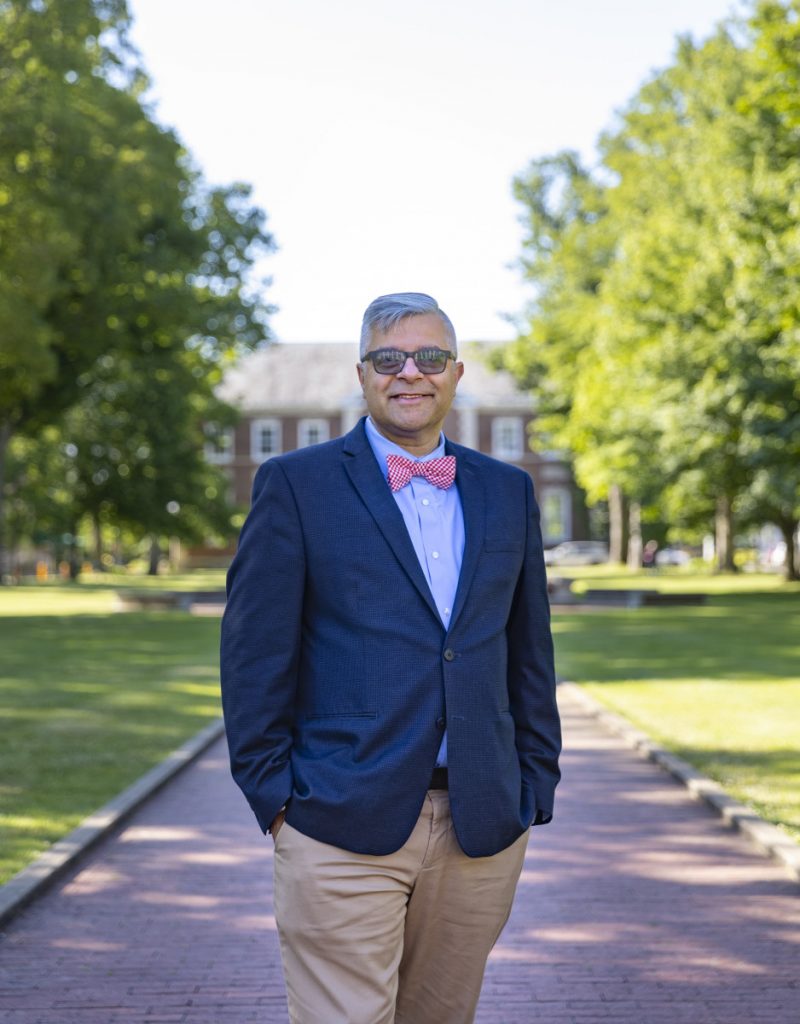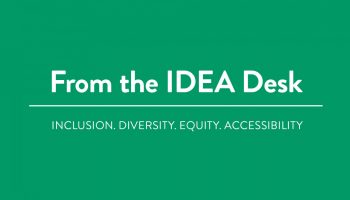DAVID KWIATKOWSKI – STAFF WRITER

In Chautauqua Institution’s 150 Forward strategic plan, one of the cross-cutting imperatives that affects all of the Institution’s key objectives is IDEA work. IDEA — which stands for inclusion, diversity, equity and accessibility — is intended to make spaces at Chautauqua more inclusive for historically marginalized groups, including people with disabilities.
On March 8, President Michael E. Hill announced Amit Taneja as the inaugural senior vice president and chief inclusion, diversity, equity and accessibility (IDEA) officer. The role oversees making sure that programming, training, procedures and policies are simultaneously supporting the four pillars of the Institution and the foundations of IDEA work. The role also serves as a member of the president’s executive team to work toward the goals set forth in 150 Forward.
Taneja was born and raised in India, and emigrated with his family to Canada in 1994. He was a first-generation college student studying engineering before switching to psychology, earning his bachelor’s degree in psychology from the University of British Columbia, then a master’s degree in college student personnel from Bowling Green State University and all but dissertation status in Syracuse University’s Higher Education doctoral program.
During his time at the University of British Columbia, Taneja noticed that universities were not necessarily designed to support the challenges he was facing as a low-income, first-generation, bi-cultural recent immigrant.
“I did really well in the first three semesters, but I had a really rough fourth semester, and I didn’t really find a lot of support,” Taneja said. “I realized that higher education wasn’t quite set up to meet the kinds of larger-than-life issues that some students bring to campus, like food insecurity and housing insecurity. I realized that I could get a graduate degree (in college administration) and actually work at a college, and then I could go and help students who face similar challenges.”
Taneja had heard of Chautauqua, and knew many extended friends and family who worked at the Institution, like his mother-in-law, who is on the board of the United Methodist Fenton Memorial Deaconess Home.
He had visited and attended some of the programming and was struck by the community and its commitment to the four pillars of education, arts, religion and recreation.
“All four of those are signs of the connected triangle of mind, body and spirit,” Taneja said. “Every time, I felt like this place was magical. I felt like I was surrounded by like-minded folks who wanted to delve into deeper questions and have intellectual conversations while enjoying a good meal or a good theater performance.”
However, when Taneja first started visiting Chautauqua, he was fresh out of graduate school and found it hard to picture himself living there while paying back student loans.
“My student loan number was a very big number at that time,” he said. “I even remember looking at some of the properties that had ‘For Sale’ signs, and being like, ‘How could we ever afford this?’ It was kind of always a dream, like, ‘Maybe one day; maybe if we work hard, this could be our experience as well.’ ”
Once he got word of the Institution’s strategic plan, and the creation of the chief IDEA officer position, Taneja felt a deep sense of mission to be a part of it.
“Diversity work is not something that happens on the side,” Taneja said. “But the Institution, its leadership, the board, have all said that this is one of our priorities. It is a rarity that’s written and that there is not only interest, but leadership from some key donors who provided the seed money to launch this work. It shows a much wider commitment.”
Since IDEA work is a cross-cutting imperative — meaning it affects all of the Institution’s objectives in 150 Forward — Taneja’s role will be to facilitate IDEA initiatives across all departments. In terms of programming, Taneja believes the Institution does a great job of diverse voices on its stages, but he recognizes the crowds in the seats do not have the same level of racial and ethnic diversity.
“How do we make Chautauqua more appealing to future generations that are living in much more multicultural environments?” Taneja asked. “How do we keep up with the times while really staying true to the mission of what this place is supposed to be about?”
Taneja believes that while IDEA work may be new for some people, getting people on board with it isn’t simply about challenging each other’s beliefs or arguing — it’s about the mission of Chautauqua being more accessible to everyone.
“I want to know Chautauqua. I want to know people, I want to know their story. I want to know what makes them anxious about IDEA work. I want to know what makes them passionate about it. I want to ask them how they might help with this work, what ideas they have. This is kind of more of a listening and data-gathering stage, rather than acting.”
Amit Taneja
Senior Vice President,
Chief Inclusion, Diversity, Equity and Accessibility Officer
“Part of it is how do we, as a community, understand the value of inclusion and diversity and accessibility?” Taneja asked. “In our wider society, we are quickly losing our ability to talk to others we disagree with. What Chautauqua does well is centering dialogue and engagement with ideas that might push our comfort zones. The ability to emulate civil dialogue is our strength.”
He realizes that the image of the typical American family has been evolving for a while, and that to secure connections for next generations of Chautauquans, the Institution needs to play some catch-up.
“If Chautauquans care about their family members, particularly the next generation, being connected to Chautauqua, then Chautauqua has to change to meet the needs of those populations,” he said. “We have to figure out in our programming and our policies, but also in the ways in which we welcome those communities that may be on the margins. How do we model a different kind of space here?”
Taneja wants to spend the first summer in his role getting to know not only the grounds, but also the people who inhabit them. Whether it be their first visit or if their family has been here for decades — he wants to spend time on their porches, saying that the community created on those front porches is Chautauqua’s “hidden fifth pillar.”
“I want to know Chautauqua,” he said. “I want to know people, I want to know their story. I want to know what makes them anxious about IDEA work. I want to know what makes them passionate about it. I want to ask them how they might help with this work, what ideas they have. This is kind of more of a listening and data-gathering stage, rather than acting.”
He has met with the leadership at the African American Heritage House, the denominational houses, and other Chautauquans who have been generous enough to host coffee and cocktail hours for him to meet more people.
“I don’t believe in just labeling people as you’re either A or B, either you’re a liberal, or you’re a conservative,” he said. “It’s more about deeply understanding: what do you think you’ll lose if we make this change? Part of it is having the skill to engage with another person, and maybe not completely alter their worldview, but at least to be able to help them understand a different perspective.”
Taneja knows that some members of the community might be apprehensive or agnostic about IDEA work, but he is conscious of this fact in how he proceeds.
“Some of this change needs to be incremental — there needs to be community buy-in,” he said. “I’m not suggesting a snail’s pace, but I’m also not suggesting a complete, overnight transformation. Neither of those are practical. I totally get that in this work, sometimes it’s one step forward, two steps back, but you have to find and know the community of folks who remind you why that change is important.”
He also believes in the importance of self-care. His version of self-care involves creating his own bow ties, knitting, DJing and flying kites. One of his mentors told him to find something that he loved to do, and he would never work a day in his life.
“I think there is actually quite a bit of truth to that,” he said. “Had I stayed in engineering, I probably could have made a lot of money. But I do feel like I’ve found my calling. So even on days when I know that I’m not looking forward to that 11 o’clock meeting, I think I have a really good sense of the big picture, like, what am I doing here? What is my purpose? I love what I do. I love the community that I’m experiencing.”


